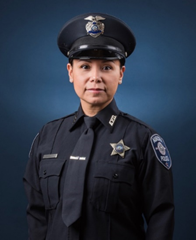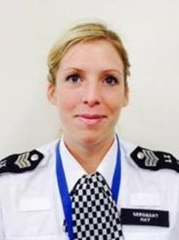|
PERF’s COVID-19 coronavirus resources, including past editions of the Daily COVID-19 Report, are available at https://www.policeforum.org/coronavirus.
For today’s COVID-19 Report, we asked 8 officers to tell us what their jobs have been like for the last two months:
Tempe, AZ Police Officer Sone Naunau:
We’re Feeling More Support in the Community

I work in patrol, and have been in the department for about a year. The biggest impact this has had on our department is the limited amount of work we can do at the patrol level.
We’ve seen a huge increase in community support, especially because we didn’t have the personal protective equipment required for us to do our jobs. We reached out to our community, and there was a huge response to get us the gear that we needed, such as cloth masks and N-95 masks. There was also a big response from some of the hardware stores to get us disinfectant sprays for cleaning our vehicles.
There was a huge change in mindset about the need to be prepared in the event that we became ill or had symptoms of COVID.
I don’t know that it has changed my interactions with people, other than being more wary about grabbing their IDs when I’m trying to identify someone. I’ll often just ask people for their information. I write it down and run it through dispatch, rather than handling their IDs. That reduces the contact I have with other people’s belongings.
This has changed the way that I come home at night. There’s obviously a concern about bringing the virus into my home. I’ve made a more concerted effort to clean my gear before I get into the house.
There was a decrease in certain types of calls for service, particularly vehicle collisions. The very first week that COVID hit was very quiet across the city. But the longer people were under stay-at-home orders, the more we saw an increase in domestic calls.
I think a lot of officers are itching to get back out and do subject stops and vehicle stops, because that’s something that we’ve greatly limited during the last 3 or 4 weeks.
I think this has increased the community awareness of police officers. Every day we pick two or three grocery stores in our area and have a presence there, so the community knows that we’re there for them. They’re more willing to approach us and call us for things that they need. I think in that sense, community policing has increased, because there’s more time for us to be in the community.
Nashville Police Officer Justin Chisholm:
I’m an FTO, and I Tell the New Officers that This Is New to Me as Well

The lockdown came on the heels of a tornado we had here in Nashville, which hit on March 3rd. For three weeks after that, we all worked 12-hour shifts with no days off. As we came off that, we were trying to figure out how to handle the COVID-19 lockdown.
The biggest changes for us have been in policy and how we’ve done things for years. Usually we respond to almost all calls. Now we’re doing a lot over the phone, or having people come outside if we do respond.
I work in a government housing neighborhood, and I’m seeing more calls for service. In those small, enclosed spaces, we’re running into more difficulty. Tensions are high. There are kids who would normally be in school, and adults who would normally be working. Everybody is home at the same time. We’re seeing a lot more domestics and disturbances throughout the community.
Nashville is a big event city, but now all our entertainment venues are shut down. So we’re having to work extra duty to provide security for those areas, because we’re seeing an uptick in thefts and burglaries without people in those venues.
I’m a Field Training Officer, and we have a class that just graduated and is in their third month of work. I have to explain to them that some of this is new to me as well, and we’re learning it together.
Baltimore Police Officer Josh Stackhouse:
There’s Tension, But I’m Trying to Engage with the Community

(Note: Photo predates onset of COVID-19)
We face some unique challenges in Baltimore City. When this all first started, it was unreal to people. People were not aware of the seriousness of it.
We have a program to hand out surgical masks to individuals who might not have access to them, because it’s a poor community we police.
I think this pandemic has, in some ways, strengthened our relationship with the community. Baltimore PD is going through a transformation right now with the Department of Justice consent decree. We hurt ourselves with a couple of issues we had, but we’re trying to bounce back from that, and I think the people in the community see that we’re making an effort. Our commissioner has been instrumental in trying to get us back to where we need to be. We also have an influx of younger officers who are pouring themselves into the work. I think it’s beginning to pay off, but there’s still tension there.
People are getting antsy because they can’t go to work if they’re not essential employees. The city has implemented a lot of outreach programs to try to curb violent crime and drug crime, in a way that encourages people to be voluntarily compliant and more involved in their community. It can’t be done by just 3,500 officers. It has to be an entire movement.
When I have free patrol time now, I try to engage the community in ways that promote social distancing. And I try to make sure that our businesses are doing okay. One of our restaurants was painting the exterior of their building, so I had my PPE gear on and helped them paint.
Volusia County, FL Sheriff’s Deputy Kyle Cloutier:
With Courthouses Closed, We Have More Personnel Available

I know some agencies have had personnel shortages, but we’ve been on the opposite end of that spectrum. Our Sheriff’s Office staffs the three courthouses in the county. All our personnel in those courthouses are now filling in spots on the road or serving as “float units.” So we actually have more people on the road, rather than less. They’ve also been handling our phone calls and walk-ups to our front desk.
The job has changed significantly during COVID-19. In the beginning there was a learning curve. We didn’t quite know how to approach situations. We carried the basic amount of PPE we needed, and we quickly learned that we didn’t have enough for the entire agency. We’ve had an outpouring support from the community, and we had a lot of masks, gloves, and other PPE donated to us.
Our communications center and dispatch are screening calls before we’re sent there. They’re asking about signs and symptoms of COVID, so we get a heads-up before we get there. And once we get there, we exercise the proper precautions to keep ourselves safe.
I don’t bring my boots or any of my work gear into my house, because I have a family and I don’t want to have them contaminated.
Kids aren’t able to socialize with their friends like they’re used to, so we’ve been doing a lot of birthday parades. I think it started with some of the officers driving together with lights and sirens on to say Happy Birthday to a young child. It really made him happy, and that has spread in our community. Families are asking us to come do it, and we’re doing several per week. It’s a good way to show our presence and make some young kids smile.
Aurora, IL Police Officer Irene Carollo:
Masks Make Us Seem Less Approachable, So Eye Contact Is Important

When our chief got COVID, it brought everything into perspective and showed the seriousness of what was happening.
After all these years, I never imagined I’d have to wear a mask to talk to people. I enjoy talking to people and practicing community policing. I feel the mask puts up a barrier and makes me seem less approachable. Eye contact is more important than ever. You have to really look at each other when you speak, to help get through this situation as best we can.
We’re trying to maintain a presence in our high call-volume areas. We’re letting people know that we’re still there. Our community has reached out for birthday parades and graduation parades, and we’ve been happy to do those to stay involved.
Our city businesses have been great. A lot of our restaurants have come out to our parking lot at different times and donated meals to everyone on shift. That’s been really appreciated, especially as we’ve moved from 8-hour shifts to 12-hour shifts.
Irving, TX Police Officer Darryl Moore:
We’re All Trying to Protect Each Other

Between our chief and our city manager, our department has been very transparent. They’ve given us a plethora of information about steps they’re planning to take. At briefings, our chief has taken questions and provided answers then and there, and made himself available. So we know why we’re doing what we’re doing, and the next steps we’ll be taking.
We’re all in our PPE gear and asking people to step outside to talk. Our dispatchers are doing their best to screen the callers and ask specific questions. Our jail staff is doing the same.
All this is for our safety, and it’s also for the community’s safety. As police officers, we come into contact with a lot of people throughout the day. So wearing our masks and keeping our distance protects everyone else too.
London Metropolitan Police Sergeant Caroline Hay:
The Public Supports Us, But Lockdown Is a Difficult Situation

During the response to COVID, opinion surveys have shown that the public very much supports us. But we’ve been having a problem with negative policing stories in the press. The police have new powers to make sure people stay at home, which is very alien to the way we police here, and it hasn’t gone down very well in the press.
We often say that people support the police until they’re policed themselves. People who would normally think “I’m a law-abiding citizen” are breaking the law by going out when they shouldn’t.
Our approach is called the 4 E’s. We engage by talking to people. We explain the new rules. We encourage them to do what we’re asking them to do. If they still don’t listen, we enforce those by giving them a fixed penalty fine.
We’re not used to having any kind of lockdown scenario, so it’s alien for me to go into a park and tell people they’re not allowed to be in that park. It’s taking away some liberties that we highly value. If it wasn’t absolutely necessary, we wouldn’t be doing it. The government has been very clear about our objectives.
I think we in policing fall into a strange sort of category. We have a strange feeling of immunity – “Oh, it won’t happen to us. We’re police officers.” So we don’t necessarily protect ourselves as well as we should. I was talking to a colleague earlier about how it’s been difficult to enforce social distancing, and then we had to remind each other that we should social-distance more. When you are the one in charge, sometimes you forget about yourself.
The Met, as a whole, has been very supportive. If you have family members who are vulnerable, you are being supported with 12 weeks of working from home or being off work.
The PERF Daily COVID-19 Report is part of the Critical Issues in Policing project, supported by the Motorola Solutions Foundation.

PERF also is grateful to the Howard G. Buffett Foundation for supporting PERF’s COVID-19 work.

|